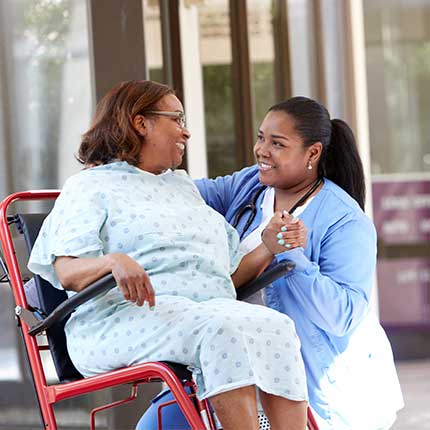Healthy Living: Obstetrics
Baby Blues vs. Post-Partum Depression
Most women expect pregnancy and childbirth to be times of great happiness and joy, but as many as 80 percent of women may have bouts of depression or “baby blues” during the first year after giving birth. These feelings may be caused by a number of factors including a sudden drop of hormones after birth, sleep changes, struggling with the changes of caring for an infant, financial problems or lack of support.
Baby Blues
The symptoms of baby blues may include:
- Feeling sad without knowing why
- Mood swings
- Anxiety
- Irritability
- Crying
- Lack of concentration
- Problems sleeping
Baby blues generally last only a few days or weeks, but it is important to mention any of these symptoms to your doctor. You can talk to friends and family members about your symptoms and ask for their help. Sometimes, just taking a nap or a walk outside can help with mood changes. You should avoid using alcohol, which can make symptoms more severe.
Post-Partum Depression
Post-partum depression is a more serious form of blues that affects about one out of seven women after giving birth. The symptoms are more intense and last longer than those of baby blues. These symptoms can interfere with a woman’s ability to cope with daily tasks. A mother with post-partum depression may not be able to care for her child and may have problems bonding. The symptoms of post-partum depression include:
- Loss of appetite
- Insomnia or sleeping too much
- Intense anger and irritability
- Overwhelming feelings of fatigue
- Loss of interest in everyday activities, including sex
- Feelings of guilt, shame or inadequacy
- Severe mood swings
- Problems bonding with the baby
- Withdrawal from family and friends
- Thoughts of harming self, the baby or others
Post-partum depression is a real medical condition and should be treated like any other disease. If you or someone you know has any of these symptoms, you should seek medical help. Talk to your doctor about your feelings and work out a treatment plan.
Post-partum depression can be treated with counseling and medication. Your doctor may refer you to a psychiatrist, psychologist or other mental health counselor. You may need to take antidepressants, which are a proven treatment for post-partum depression. Some antidepressants can be taken while breastfeeding, so talk to your doctor to see what’s best in your situation. Left untreated, post-partum depression can last up to a year or longer and may result in a chronic depressive disorder.
Here are six tips for any new moms (and dads) who are experiencing feelings of depression:
- Pay attention to your own health. Get as much sleep as possible, including naps during the day. Eat a healthy diet with lots of fruits, vegetables and whole grains. Avoid alcohol, which may make symptoms worse.
- Don’t overdo. You don’t have to be supermom. Set realistic goals of what must be accomplished each day.
- Ask for and accept help. You don’t have to do everything yourself. If a friend or family member offers to help by running errands, cooking or cleaning, take them up on it!
- Try to take some breaks. It may be hard to leave your new baby, but taking even a few minutes by yourself can help. Plan a special date night as a couple.
- Reach out to other new moms and dads. You’d be surprised by how many people are going through similar issues. Talking to someone about problems and solutions can help.
- For new dads, remember that sometimes the best thing you can do is listen. Encourage her to take breaks and give lots of verbal reassurance. Help with housework and baby chores. If you aren’t comfortable taking care of a new infant, look for hospital classes in infant care or new dad classes.


